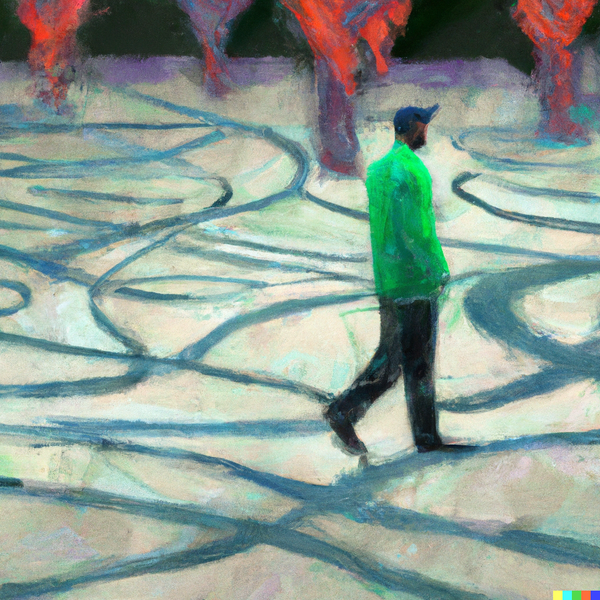earthquakes and omnipotence

On the 6th of February, 2023, an earthquake of magnitude 7.8 hit Türkiye and Syria. The epicentre of this earthquake was the city of Gaziantep in Türkiye, and according to the US Geological Survey, the earthquake struck at a depth of 17.9 kilometres.
As I write this, five days after the earthquake, the death toll has surpassed 25,000, while the number of injured people lies roughly above 80,000. Unfortunately, according to UNAID Chief Martin Griffiths, these numbers could double as rescue efforts progress.
An event as deadly as this earthquake solicits shock, tears, and most practically, donations. On hearing this news, I wondered to myself (perhaps you too)... how could such a catastrophic event occur when a good God is watching over the earth?
Scholars have posed more general versions of this question in philosophy and theology. As a believer of God and admirer of Aristotle, I find myself at an ill-formed cloverleaf, where I must seek and offer comfort to anyone riddled with similar concerns on the coexistence of evil and omnipotence.
Free-will defence
Promptly, we must deal with the proposition that evil exists simply because our free will and sinful nature instigate wickedness. This often poses as truth, particularly when there seems to be a direct connection between one or a few people and certain hurts perpetrated. Obvious examples here are Hitler and Stalin, who were indirectly behind the deaths of roughly 6 million Jews and at least 9 million Soviet citizens, respectively.
Yet… what is to be said of the 25,000+ victims of a natural disaster like this earthquake or the one on January 12, 2010, in Haiti that killed over 100,000 people?
Divine Retribution
Similarly, what if this earthquake is an expression of divine wrath? Perhaps, like the people of Sodom and Gomorrah, maybe the people in Gaziantep and Aleppo did something so wrong that God saw it fit to agitate the tectonic plates that held their homes, offices, and cribs of 10-month-old babies.
Other than the obvious fact that there is simply no way to prove that – there is no balance sheet of cumulative evils per city—, this argument implies that evils can be, and therefore, ought to be attributed to their victims.
Why then, riddle me this, do martyrs die the most painful and shameful deaths?
Soul-making defence
Could it be that God wants to use these hurts for “soul-making” purposes? Maybe this earthquake is going to remind people of the preciousness of life, one could propose.
That’s possible.
Yet… is it at all probable that this earthquake has brought more good than harm?
Let me reason like an unwise person for a bit. What if this earthquake served as an opportunity to build people’s generosity through donations? Or to remind them that we are truly not in control of anything? Or to be grateful for the safety and security we live in? Or… and I am reasoning like an unwise person here… to bring some of us closer to God?
The possibility of such "benefits" may exist, but how could a good and Omnipotent God need evil to make room for good?
Theodicy of process philosophy
Well… what if God is not omnipotent, some may ask? What if evil is simply part of the world’s evolution, and God’s power can only afford him some good, leaving room for evils like deadly natural catastrophes?
The story of Job tells us otherwise. Indeed, God not only allows evil to happen but sometimes commands it.
So, we find ourselves having exhausted all but one defence… among those that my brain could entertain.
Leibniz’s defence
The German Philosopher and Mathematician Gottfried Wilhelm Leibniz proposed the idea of “the best of all possible worlds”.
Leibniz believed that God’s wisdom must inform the creation of each state of existence at any given point on earth. This means that your reading of this entry at this very specific moment was the best possible use of these seconds of your life.
Therefore, the fall of each building whose rubbles now lie on thousands of dead bodies in Türkiye and Syria was the best possible fate for those blocks and bodies.
Leibniz’s proposition, as convenient as it appears, is too optimistic and unempathetic towards victims of not only this earthquake but also all other evils.
What Now?
There must be another way of resolving feelings of discomfort that arise when we come face-to-face with calamities as heart-wrenching as this earthquake. We need to know this “other way” because the fact that “bad” things happen, no matter their magnitude (pun unintended), is inescapable.
To deliver on what I promised you – comfort –, let me share this verse (stick with me),
“For my thoughts are not your thoughts, neither are your ways my ways,” declares the LORD. “As the heavens are higher than the earth, so are my ways higher than your ways and my thoughts than your thoughts”
What reassures me when I learn of tragedies such as this earthquake, especially in a war-ridden country like Syria, is the knowledge that the earthquake occurred at the watch of an omniscient and sovereign God. That God could stop it, but, in His wisdom, he didn’t.
His wisdom may appear irrational to us, but it doesn’t change the fact that if all of us combined could foresee world events, worse adversities than this earthquake would happen… and at a greater frequency. Therefore, all we can do is use whatever resources we have to make the aftermath of this earthquake less severe, through money, time, or talent… because that is the best we can do.
And in doing so, we find our comfort, as in my writing of this entry… I have found mine.





